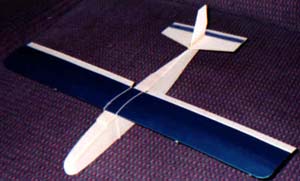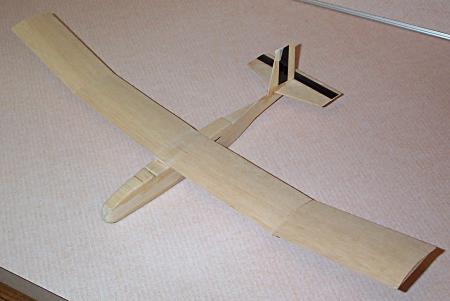
Gliders is where I started experimenting with micro planes. Since I did not have any and did not know where to get any motors powerful enough, yet light enough to power my planes, gliders were the natural answer. The first two micro planes I made were gliders, one with aileron/elevator control, "M1", the other with rudder/elevator, "M2". Both used an FMA micro 2000 Rx, two Cirrus CS-20BB servos and a 4x50mah battery pack. Here is a summary of the specifics:
| M1 | M2 | |
|---|---|---|
| Plane characteristics | Plane characteristics | |
| Wing span: 46cm (18in) | Wing span: 61cm (24in) | |
| Wing cord: 7cm (2.75in)(constant) | Wing cord: 6cm (2.5in)(constant) | |
| Wing loading: 25g/sq.dm (8.1oz/sq.ft) | Wing loading: 22g/sq.dm (7.2 oz/sq.ft) | |
| Fuse length: 33cm (13in) | Fuse length: 33cm (13in) | |
| Control: 2 channels (elevator, ailerons) | Control: 2 channels (elevator, rudder) | |
| Materials: balsa | Materials: balsa | |
| Ready to fly weight: 79.5g (2.8oz) | Ready to fly weight: 84.7g (3.0oz) |
| M1 and M2 (same radio gear) | ||
|---|---|---|
| Radio | ||
| Component | Type | Wt (g) |
| Rx | FMA Micro 2000 | 22.1 |
| Servos | 2 @ Cirrus CS-20BB | 2x9.0 |
| Battery Pack | 4-cell 50mAh NiCd | 16.4 |
| Total wt | 56.7 | |

"M1", Micro glider with elevator and aileron control.

"M2", Micro glider with elevator and rudder control.
(There are more images of M2 in the Photo Gallery.)
Construction details:
Both planes' structures were made almost entirely of balsa, with some lite
ply used to make formers. The wing of M1 is covered with Monokote to add
strength, but it also added quite a bit of weight. The wing would have
been strong enough had I left it uncovered. M2 has a wingspan of 61cm
(24in), M1 has a 41cm (18in) wingspan. Both planes use wire for control
linkages.
Flight characteristics:
I have flown both planes outside. On very calm days they fly well, but if
there is any wind they are very hard to control since they are so light and
any gust takes them for a ride.
|
|
© 2001-2004, Matthew J Litke
Contact:
uplanes [at] litke [dot] info